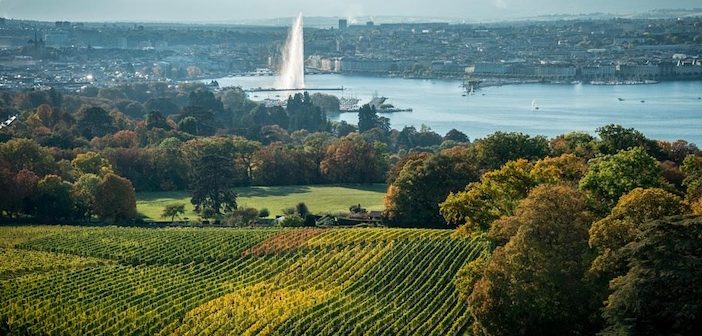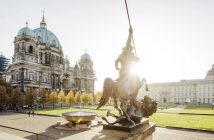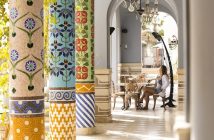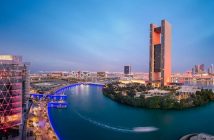In which Alice Payne finds out whether Geneva can shake off its Alpine shadow and stand alone as a destination in itself…
I’m beginning to think people are staring at us. I glance over at the mid-morning coffee drinkers lining the pavements. Yup; some are even pointing.
We are being driven through the streets of Geneva in a tuk tuk, to be fair. But this is no Oxford Street club carriage; this is its elegant, electric Swiss cousin. Nevertheless, tuk tuks are an unusual sight here and Geneva’s inhabitants are amused. Not one to relish the spotlight, I sink back and focus on the leafy streets unfurling around us.
Soon we’ve whizzed through the city centre, leaving the gawkers behind, and are being driven along the shores of Lake Geneva. It’s a beautiful autumn day and the lake’s vast, clear water reflects the cloudless sky in a Picasso-esque extravaganza of blue, broken only by the hazy outline of mountains along the horizon.
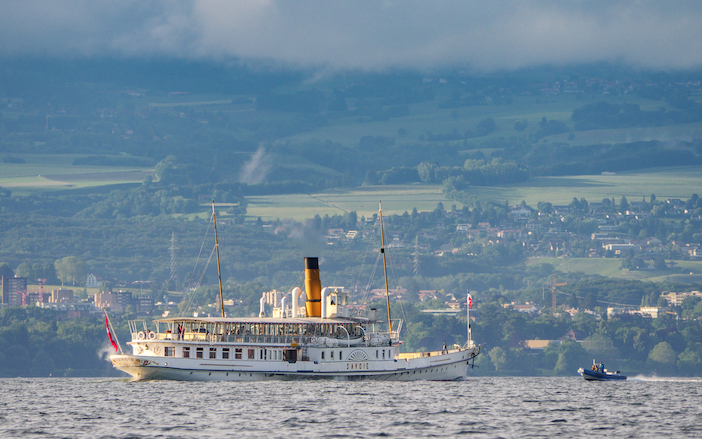
It’s so picturesque that I almost forget where we are, until the close proximity of cars reminds me. Were it winter, their bemused drivers could have seen us indulging in a fondue while on the move – one of the many tour options Welo’s tuk tuks provide – but today it still feels like summer and we’re being driven to the countryside for a vineyard tour and wine tasting.
As the gateway to the Alps, Geneva is often bypassed by visitors who head straight to the mountains, but I’m here with three companions and a busy schedule to explore the city’s attractions over three days. Might it be compelling enough to suggest skipping the Alps altogether? I’m intrigued to find out – and Geneva’s vineyards seem a good place to start.
You’d be forgiven for not knowing about the high quality of Switzerland’s wine because, despite producing around 150 million bottles per year, the Swiss are so keen on their godly nectar that only 1% makes it out of the country. Which is, in itself, a convincing reason to visit Geneva; Switzerland’s third-largest wine-growing canton. Vineyards abound here and our trip takes us to the family-owned Domaine des Balisiers which was established in the 1980s as one of the first wholly-organic vineyards.
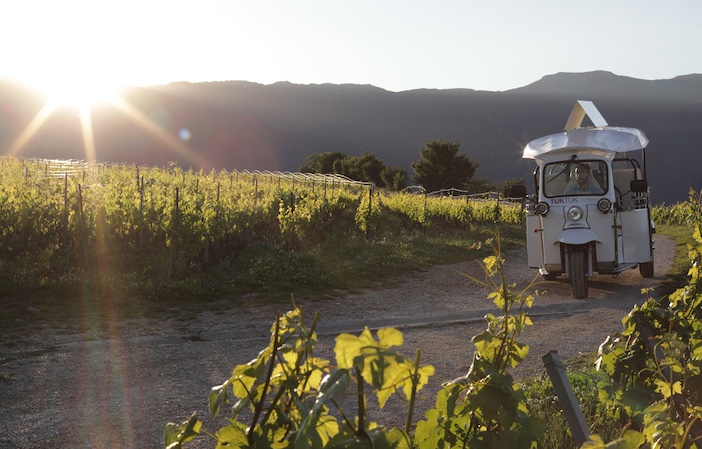
Emerging from our tuk tuk into the tranquil countryside, we’re greeted warmly by Les Balisiers’ manager, Pascal, who hosts us through a generous tasting of Pinot Noirs, Chenin Blancs, Chardonnays, sparkling wine and a typical Genevan grape – the white Chasselas. Pascal explains that the Chasselas is the most important grape in the region and every winemaker has their own style of production, vying to create the favourite. Les Balisiers’ is aged in huge concrete eggs that add a mineral taste to keep the wine light. Touring the cellar feels oddly like exploring an ovum-themed brutalist sculpture exhibition, yet after a couple of glasses I can understand why the Swiss prefer to keep its potable hatchlings to themselves.
Pleasingly sated but still able to walk straight, we head out into the vineyard. Although we’re only 10 kilometres from Geneva’s city centre, it feels like another world – with verdant fields, endless blue sky and bright sunlight streaming across acres of neatly combed vine rows, casting gentle shadows along the grass. As our eyes take in the arcadian scene, Pascal points out the Domaine de Châteauvieux, a rustic hotel perched on a nearby hill, with a two-Michelin-starred restaurant. We ask if they serve Les Basiliers’ wines. “Of course!” comes the answer.
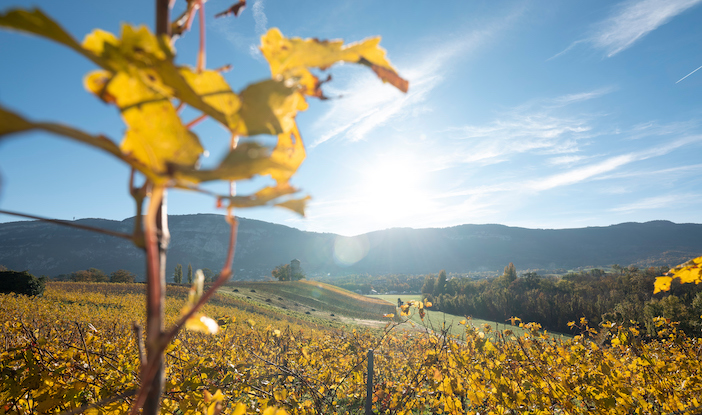
On our way back to the city we stop off at a quiet viewing platform. Since arriving, I’ve been trying to understand why Geneva feels more civilised than other cities; there are no sharp elbows, long lunches are the norm and people walk rather than rush. Looking down over the city, it’s striking to see it nestled in such an abundance of nature. The absence of skyscrapers means the surrounding mountains, national parks and sprawling lake are the only things to dwarf its inhabitants, which is probably enough to make anyone feel genial and insignificant – in the best way.
Within a day, I’ve started to think about moving here, prompted by a chocolate-making workshop, morning jogs along the lake and the city’s enticing combination of culture, nature and gastronomy. Although chocolate shops are rife in Geneva, Du Rhône Chocolatier is distinguished by being the oldest. Here, we happily spend an hour making and tasting chocolate, surrounded by made-to-order chocolate chess sets, Santa Clauses and giant baubles. But I come to regret my visit, because now I face a life not filled with regular Pavés de Genève – addictively melting cubes of buttery chocolate dusted in cocoa powder. I take comfort knowing that others suffered too, though, as Grace Kelly, Winston Churchill and Dwight Eisenhower were also fans.
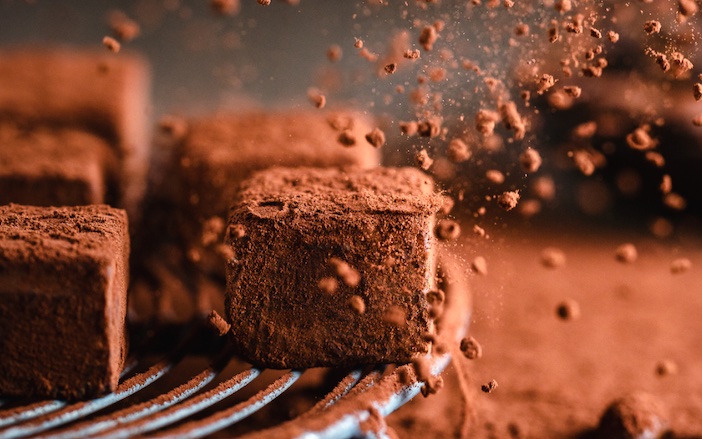
Avoiding Swiss clichés, our trip is not all chocolate and wine. Geneva has over 40 cultural institutions, and we make a slight dent in this list by visiting, among others, the Comédie de Genève and the world renowned Musée d’Ethnographie.
Despite its name and jaunty pink branding, the Comédie de Genève is a multi-genre theatre, set in a striking, 100-metre-long building with glass sides that flood the space in light. Its ethos is to be a theatre in service to the public – delivering thought-provoking performances whilst providing a welcoming community space. We don’t have time to see a performance but instead sign up for a building tour.
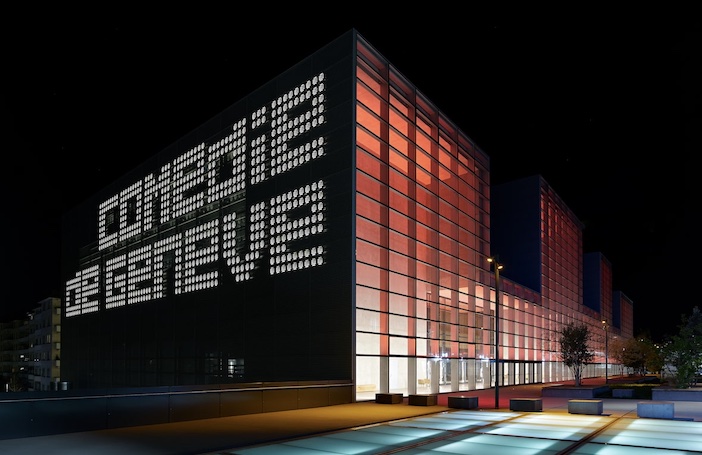
La Comédie de Genève by night © Régis Golay Federal Studio
An apex of contemporary theatre design, La Comédie feels like the Barbican’s modern grandchild, with two performance halls, plenty of public spaces and a set design workshop which passers-by can observe from the street. It describes itself as a factory for the imagination – and it feels just that as we walk around the industrial-style building, popping our heads into costume workshops, rehearsals and set constructions. We end with lunch at La Comédie’s restaurant, Le Bistrot. Its casual atmosphere belies the quality of its seasonally-inspired dishes and, having exhausted myself playing an impromptu game of shuffleboard, I devour a saucisson tartine on a bed of pickled vegetables covered in delicate shavings of cheese, followed by a squash risotto with the perfect crunch.
While La Comédie is imagining up the future, the Musée d’Ethnographie, affectionately known as MEG, was created to preserve the past, with a vast collection of objects, books, photographs and audio recordings capturing the testimonies of 1,500 cultures. Situated in La Jonction – a lively area of bars and restaurants where Geneva’s two rivers meet – the MEG encourages visitors to learn about different cultures.
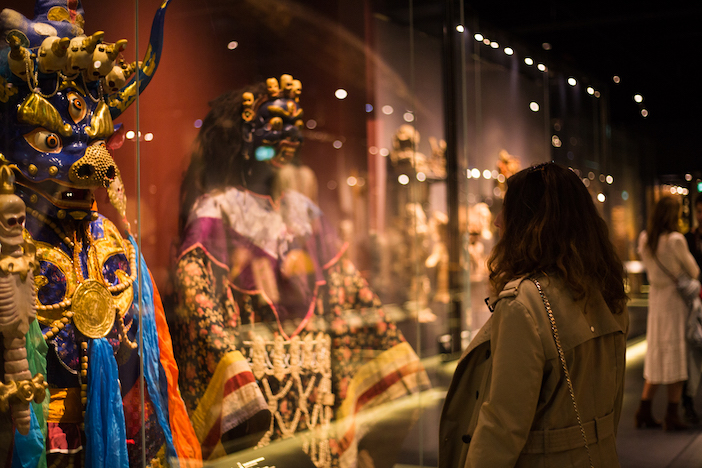
Walking along the corridors of ‘The Archives of Human Diversity’ – its darkly lit, subterranean permanent collection – delivers the sensation of voyaging across continents and time, exploring how different cultures chose to symbolise their values. But over dinner at the MEG Café, we hear how the museum is shifting its emphasis by using its collections to highlight the universal issues we face today. A recent exhibition shared perspectives from indigenous communities on the impact of climate change, whilst the upcoming ‘Being(s) together’ examines how humans can establish a more balanced relationship with animals and plants.
Holidays need to be balanced too, of course, so to equilibrate our trinity of culture, gastronomy and nature, we try out another wine tasting – this time on a boat. Unfortunately, the choppy waters and wine consumption mean that balance is the last thing to be achieved, so our wise captain drops anchor in one of the lake’s charming harbours and we spend a delightful hour soaking up the sun, taking too many photos of rainbows curving through the iconic lake fountain, waving at passing yachts and questioning why we live in London.
Exhausted but inspired, it turns out three days in Geneva isn’t enough. I will be back – not just for my precious Pavés – and it’s very likely there won’t be any skis in tow.
Flights from London to Geneva start from £46 return, with direct flights available with EasyJet, British Airways and SWISS. Rooms at the Ruby Claire Hotel & Bar range from CHF 159 (£142) to CHF 310 (£278) a night. For more information about Geneva, and for many more ideas to inspire your trip, please visit www.geneve.com.

